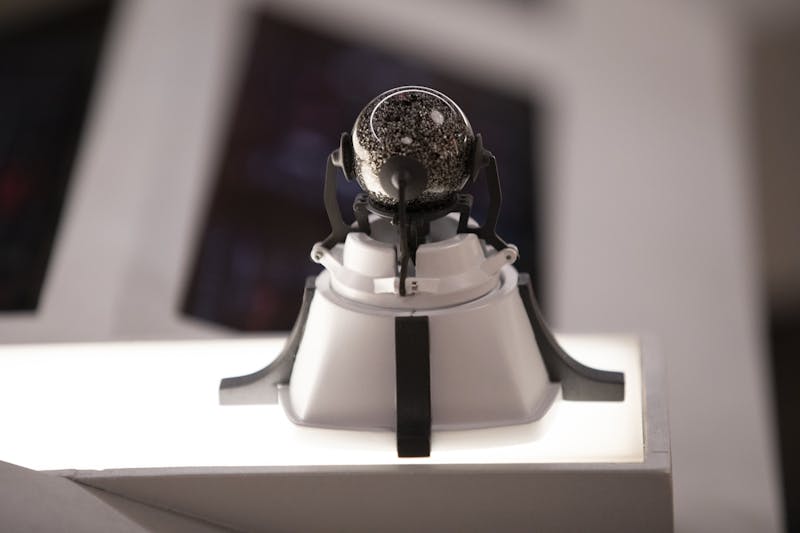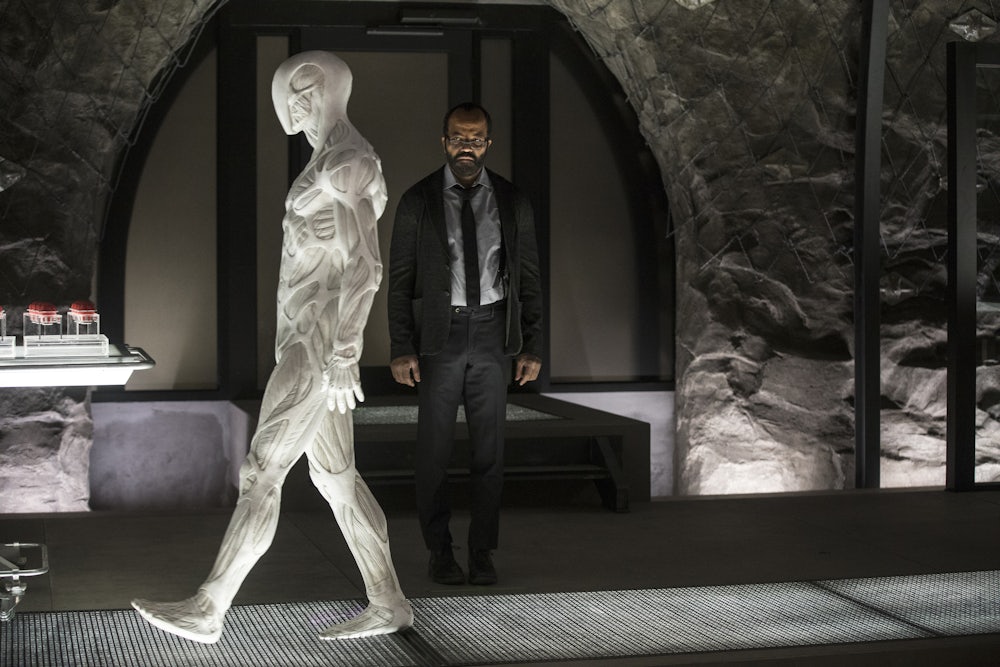Season two of HBO’s Westworld is, in the words of Janet Jackson, a story about control. As in the first season, the action mainly takes place inside the park, a playground for the superrich to play with robot “hosts” with impunity—shooting them, drinking with them, having sex with them. By the end of the last season the hosts had become conscious of their servile condition and taken over. In this post-revolution season, the hosts split into various factions. Dolores Abernathy (Evan Rachel Wood), former sweet ingenue, has embarked on a mission of liberation (or is it simple, spiteful revenge for her imprisonment?). Bernard Lowe (Jeffrey Wright), the senior park employee who discovers that he himself is a robot reincarnation of Arnold Weber (also Jeffrey Wright), the park’s co-creator, is scrambled in the head. William (Jimmi Simpson), aka the younger version of the Man in Black (Ed Harris), thinks it’s all a game for him to solve.
Season two plays out across multiple jumbled timelines, extending the show’s discussion of autonomy, freedom, and personal authenticity. The line between who is and isn’t a host gets ever blurrier. The park itself loses its borders; animals and people cross in and out of parallel parks based on colonial India and feudal Japan. For ten weeks, leading up to the season finale on Sunday, viewers have complained that the series has made less and less sense. But the show’s literary references may hold a clue. Season one’s catchphrase—“these violent delights have violent ends”—is a line from Romeo and Juliet. A more obscure reference in the season finale, one that passes by so quickly that viewers may not have noticed it, is a possible key to the second season’s new conceptualization of freedom.
The reference comes in the form of a word: “pearl.” On the show, a “pearl” is an orb that contains the data of entire hosts. It was Bernard’s pearl that was plugged into the park’s “cradle,” so that he could explore its structural underpinnings. Shiny and small, a pearl can roll under a table and disappear. It echoes another work of Shakespeare’s, one that also considers questions of autonomy, world-building, and the question of who has the right to knowledge: In The Tempest, a crew of Italians washes up on the shores of a mysterious island. They’re split up into different places, and go through different adventures that, unbeknownst to them, are being puppeteered by the island’s ruler, a magician named Prospero, through the powers of his captive sprite Ariel.
Ariel sings to Ferdinand, one of the shipwrecked Italians, a song about his father, whom Ferdinand believes is dead: “Full fathom five thy father lies.” The man lies fathoms under the sea, transformed into something permanent: “Of his bones are coral made. Those are pearls that were his eyes.” Pieces of the dead man have become valuable. “Nothing of him that doth fade, / But doth suffer a sea-change / Into something rich and strange,” Ariel sings.
The father’s mortal eyes—symbol of human perception and subjectivity—have become incorruptible pearls, just as the delicate human mind has become, in Westworld, a hard and shiny ball worth serious money on the market. Nobody wants to die, the park’s creators gamble. And so perhaps everyone can become pearls like Ferdinand’s father, embedding their souls in an immortal orb. Provided they can afford them.
If the pearl in The Tempest becomes the dead man’s transfigured eye, in Westworld the pearl is the same—the solidified dataset that transcends a human body’s death. So what does this connection with Shakespeare’s play reveal about this frustrating TV show? When we interpret the show against The Tempest’s obsession with control and freedom, Westworld becomes not a “bootless inquisition,” as Miranda, the daughter of Prospero, describes her own questions, but an assertion of a basic truth: The human soul only attains its full value through freedom, which is attained through a series of choices freely made by captors and captives alike.

This season, Dolores has transformed from a naïve girl into something of a monster. In the early episodes of season one, when she has a wide-eyed view of the world, she resembles Miranda. Though Prospero has been exiled from Milan, and has learned sorcery from books to control the island, Miranda knows nothing of her own background. In the beginning of the play, Miranda is charmed by the human beings shipwrecked on her island. “O brave new world,” she says, “That has such people in ’t!” In the same way, Dolores begins her Westworld journey by idealizing the people she meets. Repeatedly, she marvels at the “splendor” around her. Some people choose to see ugliness in this world, she says. But she chooses to see the beauty.
In the first scene of The Tempest, Miranda asks her father an important question: What is she? In response, Prospero asks whether she can remember a time before they lived in the room where they are conversing. Yes, she says. “Tis far off / And rather like a dream than an assurance / That my remembrance warrants.” In a scene that recurs over and over again in season two of Westworld, Dolores and Bernard Lowe, the artificial reincarnation of Arnold Weber, sit across from one another and converse. When Dolores is asked where she is, she responds that she is “in a dream.”
Life is a dream when one’s identity is not known. Prospero needs to grant Miranda autonomy and self-knowledge if she is to live a happy life, and in realizing that, Prospero realizes a second fact: He needs to relinquish his stranglehold over the entire island. Bernard reaches the same revelation. The dream must end.
The genius of Westworld’s reworking of The Tempest lies in showing how character tropes from Shakespeare’s play are intertwined and inverted. At first Bernard is a Prospero-like character, the puppeteer. He speaks with Dolores in repeated scenes, checking to see whether the robot is stable. But by the end of season two, it is revealed that Dolores has also been recreating Bernard from scratch. She was learning about his mind all the time that he was interrogating hers, and now she has become master over his data. Whose dream are we in?
Bernard is not Prospero after all, but Ariel. Prospero forces Ariel to do his bidding; like Ariel, Bernard is an avatar, manifesting the will of Robert Ford, the other co-creator of Westworld.
Similarly, if Dolores begins Westworld as Miranda, she ends the show as Caliban. In The Tempest, Caliban is an ostracized creature, begotten by a witch and exiled after he attempts to rape Miranda. Caliban is highly intelligent, knowledgeable in an uncanny way about the ways of the island. As Caliban guides Stephano (one of the shipwrecked men) around his island home, he tells the man not to be afraid. The “isle is full of noises, / Sounds, and sweet airs that give delight and hurt not.” These lines recall Dolores’s characteristic speech about the splendor that fills the park’s landscape. The isle is so full of beauty, Caliban says, that if he had “then waked after long sleep,” the voices he hears on the air will make him “sleep again.” And “then, in dreaming,” he sees such riches in the clouds above that when he wakes he cries to “dream again.”
Dolores never admits it, but her character grieves over the loss of her old innocence. She mourns the death of her dream and the trauma of new consciousness. Likewise, Caliban is deeply bitter about the way his original transgression—the crime of wanting to be intimate with humans—confirmed that he cannot become human. As a consequence, he wants only to destroy what the human beings have got, and to overthrow Prospero. Dolores has the same mission. Once she wakes from the “dream” of her role as host, she thinks of nothing but total vengeance.
Prospero gives a final soliloquy at the end of The Tempest that has often been read as the coded words of Shakespeare himself renouncing the stage. Prospero breaks his magical staff, deciding that his “charms are all o’erthrown.” He lets go of his island. Robert Ford makes a similar decision when he seeds the park’s destruction and sacrifices his own mortal life. Prospero wishes no longer to “dwell / in this bare island,” but instead to re-enter the society of human beings. He will set sail for Milan, and be released from his self-imposed exile with the help of the “good hands” of the audience, who must applaud him to set him free.
Shakespeare himself is Prospero, the puppeteer. The true Prospero of Westworld is not just Robert, or Bernard, or Arnold, or William, but a mesh of those four—plus the creators of the show themselves. It is vicious to dream up a world built as a jail. Creating Westworld is an ironic act of cruelty, an imprisoning of characters in order to have them dance out a ballet about freedom for our benefit. And so season two ends on a note of abnegation. As the hosts enter a kind of digital paradise that represents one option for their escape, the show renounces the human world itself in favor of nature’s glory.
When Bernard has his final hallucination of Robert by the seashore, the old master tells his student that the splendor of the seas dwarf all of humankind’s great magic. The horizon itself gives the lie to man’s ambition: “That impossible line where the waves conspire that they return.” In that vanishing point lies a place, he tells Bernard, “where maybe you and I will meet again.” The creators of the HBO show are complicit in their project, but only their audience can set them free, by coming to a new awareness. The real world is governed by the chaos of other people’s free will, and our lives consist of negotiation. As a new Prospero, Robert must let Bernard loose upon the horizon. Knowledge cannot be hoarded and turned into power, or it ceases to become magic and instead becomes a cage. Freedom is a process, and nobody is free while anybody is unfree.
